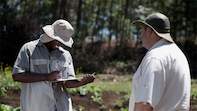
The Agricultural Research Council sees itself as a premier research institute.
It aims to develop knowledge and technologies that enhance agricultural efficiencies in everything form of farming, from crop to livestock, wildlife and aquaculture production.
The aim, however, is not only to enhance production, but to promote food safety and ensure sustainable outcomes, in terms of conservation, the use of natural resources, transformation and, climatic and other production risks.
The institute has an administrative office in Hatfield Pretoria in Gauteng, with several commodity-based research campuses that can be clustered into five business divisions, namely Crop Sciences, Animal Sciences, Natural Resources and Engineering, Agro-processing, and Transformation of the Agriculture Sector.
Research at these campuses is complemented by on-field experimental sites distributed throughout every province of South Africa. Some of the research is also tested on actual farms, to evaluate the performance of the technologies under real production conditions.
The Tropical and Subtropical Crops (ARC-TSC) is situated in Mblombela in Mpumalanga and focuses on citrus, avocado, mango, litchi, banana, guava, macadamia, nut, pineapple, granadilla, pecan nut, coffee and ginger production, as well as exotic crops, indigenous fruit, medicinal plants, herbs and essential oil crops.
The Agricultural Research Council Infruitec-Nietvooribij is situated in Stellenbosch and focuses on vine and wine production, deciduous fruit, such as apples, pears, plums, peaches, apricots, vine as well as olives and fynbos. The division has six research farms, representing different climatic conditions, throughout the Western Cape.
Besides research, the Agricultural Research Council Infruitec-Nietvoorbij is the custodian of grapevine, deciduous fruit and wine yeast gene banks that preserve genetic resources for breeding, training and comparative descriptions.
Research on ornamental crops and vegetables are conducted at the Agricultural Research Council Vegetables and Ornamental Plants division at Roodeplaat, Gauteng. The vegetables range from potatoes, sweet potatoes, onions and tomatoes to chillies, garlic and leafy vegetables. The indigenous vegetables include crops, such as amaranth and amadumbe as well as medicinal plants, such as cancer bush, moringa and wild ginger.
At Potchefstroom in the North West, the ARC-Grain Crops focusses on grain crops, which include summer grains, such as maize, sorghum and millet, as well as oil and protein seeds, such as sunflower, groundnut, soy beans, dry beans and cowpeas.
In the same province, the ARC-Industrial Crops in Rustenburg, focuses on cotton, tobacco and other industrial crops, such as hemp, flax and cassava.
As indicated by the name, the ARC-Small Grain Division in Bethlehem, Free State, focusses on the improvement and cultivation of small grain crops, such as wheat, barley, oats, triticale and rye.
The Plant Health and Protection division in Roodeplaat and several strategic areas around South Africa focuses on promoting economic and environmentally responsible weed, disease and insect management strategies.
The Agricultural Economics and Capacity Development Division is responsible for translating research results into reusable outputs in support of agrarian transformation and the efficiency and competitiveness of the sector.
 South Africa’s agricultural sector is one of the world’s most diverse, consisting of corporate and private intensive and extensive crop ...
South Africa’s agricultural sector is one of the world’s most diverse, consisting of corporate and private intensive and extensive crop ...